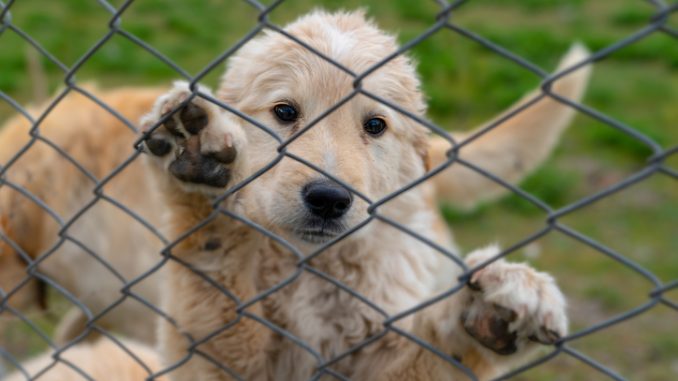
By Aaron Gibbings
This past summer, the New York State Legislature passed the Puppy Mill Pipeline Bill (A.4283/S.1130), with landslide majorities in favor in both houses.
The bill would prohibit the retail sale of dogs, cats, and rabbits sourced from commercial companion animal breeding facilities, commonly known as “puppy mills.” Recently, these breeding facilities have been known for the allegedly abusive conditions animals endure under their care.
The U.S. Department of Agriculture (USDA), which regulates commercial breeders, has cited dozens of such facilities for violations in 2022 alone: 19 in Iowa, 16 in Missouri, 13 in Wisconsin, and countless others throughout the nation. Violations cited include overcrowding, unsanitary conditions, underfeeding, insufficient veterinary care, physical abuse, and improper euthanization practices, among other offenses.
In one example, the USDA shuttered facilities belonging to Iowa breeder Daniel Gingerich after discovering sick, emaciated, injured, and dead dogs at his puppy mill. Gingerich ultimately served prison time for severe animal neglect. Pet retailers in New York commonly import their animals from breeders like Gingerich in other U.S. states.
The bill enjoyed strong bipartisan support, passing 57-5 in the Senate and 133-15 in the Assembly. It has been endorsed by many of the largest animal welfare organizations operating in New York, including the American Society for the Prevention of Cruelty to Animals (ASPCA), the Humane Society of the United States, and the New York State Animal Protection Federation (NYSAPF), which represents animal shelters across the state.
Long Island Life & Politics spoke to Brian Shapiro, New York State Director of the Humane Society and former county legislator, for comment. “People are not putting up with that anymore and that’s why this bill is so popular,” he said.
According to market research and statistics aggregator Statista, live animal sales represent less than 5% of revenue within the $124 billion pet industry as of 2021, the smallest category of the industry’s income. As consumers have become increasingly aware of the origins of their animal companions, and the harrowing conditions they endure en route to pet stores, New York has seen public pressure grow on the state to end business relations with puppy mills.
“New York should not be propping up failed business models. That’s not the role of New York State. That’s why the legislature – both Republicans and Democrats – passed this bill with such huge margins,” Shapiro said.
Per According to the Humane Society, puppy mills are characterized by an “emphasis on quantity over quality, indiscriminate breeding, continuous confinement, lack of human contact and environmental enrichment, poor husbandry, and minimal to no veterinary care,” as well as a tendency to prioritize profit to the great detriment of an animal’s well-being.
Shapiro emphasized that the Humane Society is not opposed to breeding in general; the organization in fact fully endorses humane breeding practices. He noted that the bill “would not prevent anyone from getting a purebred dog from a responsible breeder or choosing to support a local shelter.”
“If I want a boxer, there are innumerable rescues across the state, and breeders who care about the animals [and] the litters that their animals are producing,” Shapiro said.
However, Shapiro noted, the Puppy Mill Pipeline Bill supports the retail sale of responsibly rescued and sheltered animals through pet stores. “People will still have access to getting purebred animals from responsible breeders,” Shapiro said.
Suffolk County’s Role
New York State has a well-established precedent for promoting animal welfare. In 2017, for instance, the state established the Companion Animal Capital Fund, the nation’s first public fund for capital investments in the improvement of animal shelters. As of 2022, over $20 million has been dedicated to enhancing the living conditions in animal shelters through the program, including renovation, rehabilitation, and expansion of shelter properties for the health, safety, and quality of life of the animals within. Meanwhile, in 2019, then-governor Andrew Cuomo ratified a separate law establishing more protections for animals sold at pet stores.
Local elected officials made great strides in getting their respective bills passed. In 2014, the Suffolk County Legislature passed a bill banning the sale of puppies and kittens bred in “puppy mills.” Riverhead Town Councilman Ken Rothwell first proposed a similar initiative in 2021 which was approved by the Riverhead Town Board. During a 2021 public hearing, Wading River veterinary technician Carol Sclafani advocated for “sever[ing] the puppy mill pipeline” – coining the very title that the bill now bears in the process.
Several commercial dog and companion animal breeding facilities were contacted for a statement, but none were available to provide an interview.
Shapiro said he is waiting for the governor’s signature. “It’s up to Governor Hochul to support this bill and to do the right thing for New York State.”

